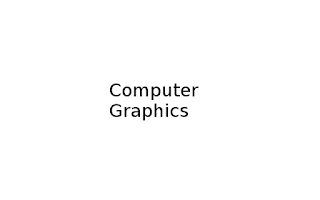Course
no: CSC-254 Full Marks: 60+20+20
Credit
hours: 3 Pass Marks: 24+8+8
Nature
of course: Theory (3 Hrs.) + Case Study
Course Synopsis: This
Graphics hardware, software, and applications, data structures for
graphics, graphics languages, models for 2D and 3D objects, clipping,
hidden surface elimination, depth buffer, raster graphics, shading
rendering, splines tools.
Goal:The objective of
this course is to understand the theoretical foundation of 2D and 3D
graphics.
Course Contents:
Unit
1. 5 Hrs.
Introduction,
Advantage of Computer Graphics, Areas of Applications, Hardware and
Software for Computer Graphics. (Hard Copy, Display Technologies),
Random Scan Display System, Video Controller, Random Scan Display
Processor. Raster Graphics, Scan Conversion Algorithms (Line, Circle,
Ellipse), Area Filling (Rectangle, Ellipse), Clipping (Lines, Circle,
Ellipse), Clipping Polygons.
Unit
2. 10 Hrs.
Geometrical
Transformations, Homogenous coordinates, 2D and 3D Transformations,
Matrix Representations, Window to View Port Transformation. 3D
Viewing, Projections, Mathematics of Projections.
Unit
3. 15 Hrs.
3D
Object Representation, Representing Curves and Surfaces, (Polygon
Meshes, Parametric Cubic Curves, Quadratic Surface), Solid Modeling
(Sweep Representation, Boundary Representation, Spatial Partitioning
Representation)
Unit
4. 12 Hrs.
Visible
Surface Determination, Various Techniques, Algorithms for Visible
Surface Detection, (Z- Buffer, List priority, Scan Line Algorithms),
Shading and Illumination models.
Unit
5. 3 Hrs.
Introduction
to virtual Reality and Animation.
Laboratory
works: All algorithms covered in the text to be implemented in
PHIGS/OpenGL in C/C++.
Text /
References books:
-
Foley, J. D., A. V. Dam, S. K. Feiner, J. F. Hughes, Computer Graphics Principle and Practices, Addison Wesley Longman, Singapore Pvt. Ltd., 1999.
-
Hearn Donald, M. P. Baker, Computer Graphics, 2E, Prentice Hall of India Private Limited, New Delhi, 2000.

Comments
Post a Comment